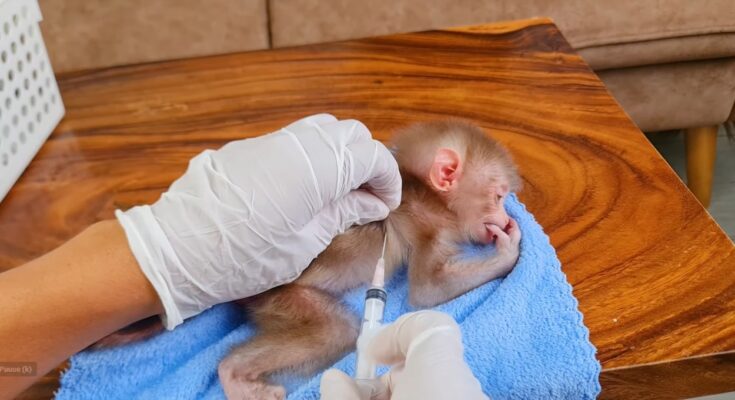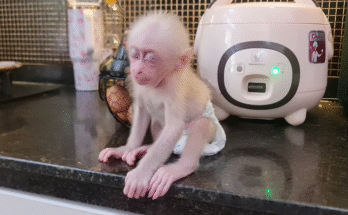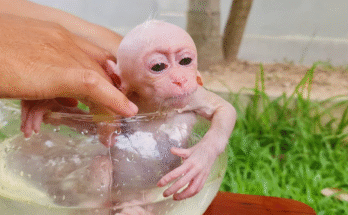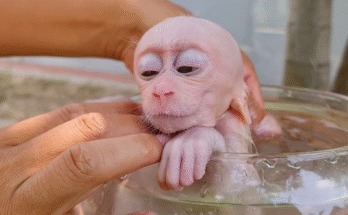Caring for a newborn monkey is a delicate yet rewarding responsibility that requires patience, knowledge, and compassion. These tiny creatures, often born weak and fragile, rely entirely on their caregivers for survival and development. Providing proper care starts with understanding their nutritional, medical, and emotional needs.
One of the critical aspects of nurturing a newborn monkey is administering essential medications. Whether it’s vitamins, antibiotics, or vaccines, these treatments play a vital role in building their immunity and preventing illnesses. When medicating, it’s important to use sterilized tools and consult a veterinarian to ensure accurate dosages and safe practices. Gentle handling is crucial to avoid causing stress or injury to the baby monkey.
Beyond medication, newborn monkeys thrive on warmth, affection, and a sense of security. Mimicking their natural environment, such as using soft blankets or simulated maternal care, can help them feel safe and nurtured. Regular feeding schedules, proper hygiene, and consistent monitoring of their health further contribute to their well-being.
Ultimately, caring for a newborn monkey isn’t just about meeting their physical needs; it’s about creating a bond of trust and love. With the right approach, these tiny primates can grow into healthy, happy companions, making the effort truly worthwhile.
This article emphasizes compassionate care and expert advice, appealing to high-value audiences interested in animal welfare and professional guidance.
A Dose of Care: Nurturing a Newborn Monkey
Caring for a newborn monkey is a profound responsibility that combines compassion, expertise, and attention to detail. These tiny primates, often born vulnerable and dependent, require specialized care to ensure their growth and survival. This comprehensive guide explores the essential steps to properly nurture a newborn monkey, emphasizing both medical and emotional support.
1. Understanding the Newborn Monkey’s Needs
Newborn monkeys, much like human infants, are fragile and require constant care. They depend entirely on their caregivers for:
- Nutrition: A newborn monkey’s diet typically starts with formula milk specially designed for primates. It is vital to avoid cow’s milk, as it can upset their delicate digestive systems.
- Warmth: These tiny creatures need a warm and cozy environment to mimic the comfort of their mother’s embrace. Heating pads and soft blankets can help maintain the appropriate temperature.
- Emotional Security: Monkeys are social animals. They thrive when they feel loved, safe, and secure, which helps reduce stress and promotes healthy development.
2. Administering Essential Medication
Proper medical care is critical to a newborn monkey’s survival. Medications such as vitamins, vaccines, and antibiotics may be necessary to protect them from diseases and build their immunity. Follow these key steps when administering medication:
- Consult a Veterinarian: Always seek professional advice before starting any treatment to ensure the medication and dosage are appropriate for the monkey’s age and weight.
- Use Sterile Tools: Ensure syringes, droppers, or feeding bottles are sterilized to prevent infections.
- Gentle Handling: Hold the monkey securely but gently to avoid stress or injury during medication.
3. Providing Proper Nutrition
Feeding is a cornerstone of newborn monkey care. The right nutrition supports their physical growth and cognitive development. Here’s how to manage their feeding schedule:
- Choose the Right Formula: Use a primate-specific formula that mimics the nutritional profile of natural monkey milk.
- Establish a Routine: Feed the baby every 2-3 hours, day and night, to meet their nutritional needs.
- Monitor Weight: Regularly weigh the monkey to ensure they are gaining weight as expected, a sign of good health.
4. Creating a Safe and Nurturing Environment
The environment plays a significant role in a newborn monkey’s well-being. Recreate a habitat that feels natural and secure:
- Temperature Control: Maintain a consistent, warm temperature using heating pads or lamps.
- Hygiene: Keep their bedding clean and dry to prevent infections.
- Stimulation: Introduce soft toys or other items to stimulate their curiosity and encourage natural behaviors.
5. Bonding and Socialization
Building a strong bond with the newborn monkey is essential for their emotional health. Gentle touches, soothing voices, and regular interaction help establish trust and reduce anxiety. Over time, introducing them to other monkeys or pets can aid in their socialization.
6. Monitoring Health and Development
Vigilant monitoring ensures that any health issues are addressed promptly. Watch for signs such as:
- Changes in appetite or weight
- Unusual lethargy or behavior
- Signs of illness such as coughing, diarrhea, or rashes If any concerns arise, consult a veterinarian immediately.
7. Challenges in Caring for Newborn Monkeys
Nurturing a newborn monkey is not without challenges. Common difficulties include:
- Health Complications: Premature monkeys or those separated from their mothers may face additional medical issues.
- Emotional Attachment: While bonding is crucial, overattachment can make eventual reintegration with other monkeys more difficult.
- Time Commitment: Caring for a newborn monkey requires round-the-clock attention and dedication.
8. Why Proper Care Matters
Providing exceptional care for a newborn monkey is not just about ensuring their survival. It’s about giving them a chance to thrive and lead a healthy, happy life. For those who care for monkeys professionally, whether in sanctuaries or research facilities, proper nurturing also sets the stage for successful socialization and integration into larger groups.
Conclusion
A newborn monkey represents hope and innocence, requiring immense love and care to flourish. By understanding their needs, providing medical attention, and creating a nurturing environment, caregivers can ensure these tiny primates grow into healthy, happy individuals. While challenging, the process is deeply rewarding, offering the opportunity to build a profound connection with one of nature’s most intelligent and endearing creatures.
By following these guidelines, you’re not just nurturing a life – you’re making a lasting difference in the world of animal care. For more expert advice on primate care, explore our website for detailed resources and tips.
Don’t Throw the Baby Out with the Bathwater: A Monkey’s Bathing Secret
How to Bathe a Newborn Monkey Without Tears
Bathing a newborn monkey can be challenging, especially when they cry intensely. To ensure a smooth and tear-free experience, start by creating a calm environment. Use warm water at a comfortable temperature, as monkeys are sensitive to cold. Gently hold the baby monkey, ensuring they feel secure and supported. Use a soft cloth to clean their delicate skin without harsh scrubbing. Keep the session short to avoid overstimulation. Singing or speaking softly can help soothe them. After the bath, wrap them in a warm towel and provide gentle cuddles. With these methods, bathtime becomes a relaxing bonding experience.
How to Bathe a Newborn Monkey Without Tears
Bathing a newborn monkey can be a delicate task, as these tiny creatures are highly sensitive and prone to stress. A calm, comfortable bath routine is essential for their well-being and to foster trust between you and the baby monkey. In this detailed guide, we will cover every step to ensure a smooth, tear-free bathing experience for your newborn monkey.
1. Prepare the Environment
Creating the right environment is the first step in making bath time stress-free:
- Quiet Space: Choose a quiet room away from loud noises or distractions.
- Temperature Control: Ensure the room is warm, ideally between 75-85°F (24-29°C), to prevent the monkey from feeling cold.
- Warm Water: Use lukewarm water, between 100-105°F (37-40°C), tested with a thermometer or your wrist to ensure comfort.
2. Gather the Necessary Supplies
Having everything ready before starting ensures a smooth process:
- A small basin or sink lined with a non-slip mat.
- Mild, monkey-safe shampoo or soap.
- A soft washcloth or sponge.
- Towels, preferably soft and absorbent.
- A clean, dry blanket for after the bath.
3. Handle the Baby Monkey Gently
Newborn monkeys are fragile and need to feel secure:
- Hold Them Comfortably: Use one hand to support their back and neck, ensuring they feel safe.
- Speak Softly: Calmly talk or hum to them, as your voice can be soothing.
- Keep Eye Contact: This builds trust and reassures the monkey.
4. Step-by-Step Bathing Process
Follow these steps to bathe your newborn monkey effectively:
A. Wetting the Monkey
- Gradually pour warm water over their body using a small cup. Avoid splashing water on their face to prevent distress.
B. Cleaning
- Use a soft cloth or your hand to gently lather the shampoo or soap on their skin. Focus on areas that tend to accumulate dirt, such as underarms, neck folds, and behind the ears.
- Be extra careful with their face. Use a damp cloth to wipe it gently without getting water or soap in their eyes.
C. Rinsing
- Pour warm water over the monkey’s body to remove soap thoroughly. Residual soap can irritate their sensitive skin.
D. Drying
- Immediately wrap the monkey in a soft towel to keep them warm. Gently pat their skin dry, avoiding any rubbing motion.
5. Post-Bath Care
- Comfort Them: After drying, cuddle the monkey in a warm blanket. This helps them feel safe and secure.
- Check Their Skin: Look for any signs of irritation or dryness and apply a veterinarian-approved moisturizer if needed.
- Reward with Love: Offer gentle strokes or a favorite treat to associate bathtime with positive feelings.
6. Tips for a Tear-Free Experience
- Short Sessions: Keep baths under 10 minutes to avoid overstimulation.
- Consistency: Establish a regular bath routine so the monkey becomes accustomed to the process.
- Use Soothing Techniques: Soft humming or playing calm music can create a relaxing atmosphere.
7. Common Mistakes to Avoid
- Using Cold Water: Always ensure the water is warm but not hot.
- Over-Bathing: Bathing too frequently can dry out the monkey’s skin. Once or twice a week is sufficient.
- Rushing: Take your time to handle the monkey gently and patiently.
8. When to Seek Professional Help
If your newborn monkey exhibits signs of extreme distress, skin issues, or unusual behavior after bathing, consult a veterinarian or a primate care expert immediately.
Conclusion
Bathing a newborn monkey without tears is all about preparation, patience, and gentleness. By creating a safe and comforting environment, using appropriate supplies, and following the steps outlined above, you can turn bath time into a bonding experience rather than a stressful ordeal. Remember, the key is to make the monkey feel loved and secure, ensuring their physical and emotional well-being.



